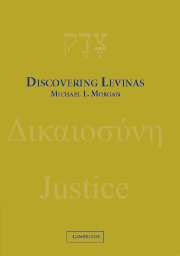Book contents
- Frontmatter
- Contents
- Preface
- Acknowledgments
- 1 Auschwitz, Politics, and the Twentieth Century
- 2 Phenomenology and Transcendental Philosophy
- 3 The Ethical Content of the Face-to-Face
- 4 Philosophy, Totality, and the Everyday
- 5 Meaning, Culture, and Language
- 6 Subjectivity and the Self
- 7 God and Philosophy
- 8 Time, Messianism, and Diachrony
- 9 Ethical Realism and Contemporary Moral Philosophy
- 10 Beyond Language and Expressibility
- 11 Judaism, Ethics, and Religion
- Conclusion: Levinas and the Primacy of the Ethical – Kant, Kierkegaard, and Derrida
- Appendix: Facing Reasons
- Bibliography
- Index
4 - Philosophy, Totality, and the Everyday
Published online by Cambridge University Press: 05 June 2012
- Frontmatter
- Contents
- Preface
- Acknowledgments
- 1 Auschwitz, Politics, and the Twentieth Century
- 2 Phenomenology and Transcendental Philosophy
- 3 The Ethical Content of the Face-to-Face
- 4 Philosophy, Totality, and the Everyday
- 5 Meaning, Culture, and Language
- 6 Subjectivity and the Self
- 7 God and Philosophy
- 8 Time, Messianism, and Diachrony
- 9 Ethical Realism and Contemporary Moral Philosophy
- 10 Beyond Language and Expressibility
- 11 Judaism, Ethics, and Religion
- Conclusion: Levinas and the Primacy of the Ethical – Kant, Kierkegaard, and Derrida
- Appendix: Facing Reasons
- Bibliography
- Index
Summary
PHILOSOPHY AND THE EVERYDAY
Most often, when Levinas turns to the encounter with the face of the other in order to shed light on its objective or subjective side, he does so within the context of everyday life and ordinary experience. His accounts are abstract and metaphorical, but they arise out of everyday experiences of misery and suffering, of the orphan, the stranger, the poor, and the widow. Their biblical overtones notwithstanding, such figures are ones whom we meet in ordinary life. As we have pointed out, it is as if he is locating a dimension of experience largely hidden from view, obscured by our habits and ways of conducting affairs or distorted by culturally and historically grounded attitudes, as a reminder of the fundamental meaning of our humanity. The face is both in our lives and somehow not in them; it confronts us in ordinary life and yet also from outside it. The face is not a phenomenon, but rather, as Levinas comes to put it, an enigma, or riddle, a challenge to what is customary and accepted, and yet also in some ways a foundation.
Philosophy reaches out and locates the face-to-face and describes and clarifies it, and hence philosophy arises at least in part for moral reasons, because clarification and articulation are needed. But philosophy is located in the everyday and always returns to it. One wonders, however, if and in what sense it really leaves it.
- Type
- Chapter
- Information
- Discovering Levinas , pp. 85 - 114Publisher: Cambridge University PressPrint publication year: 2007



